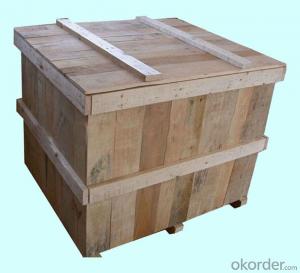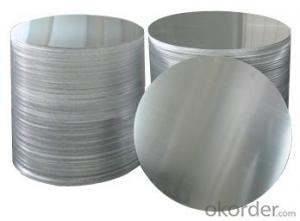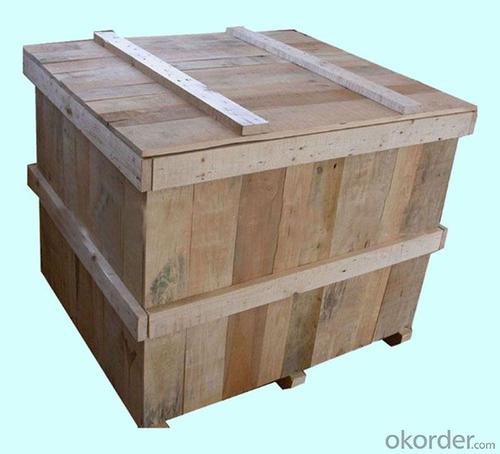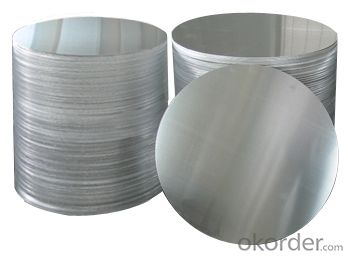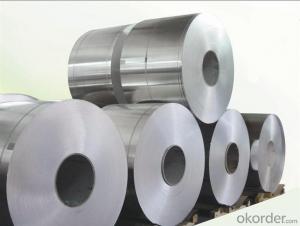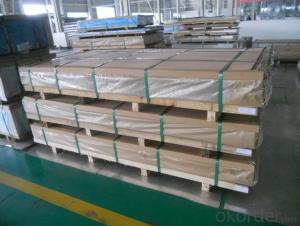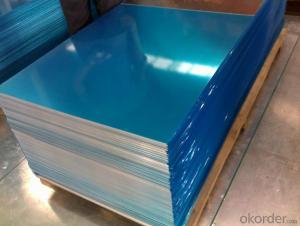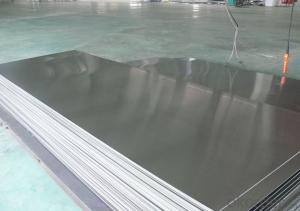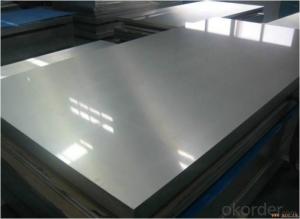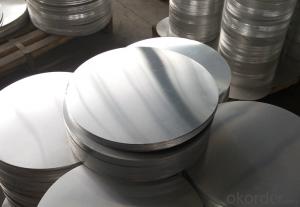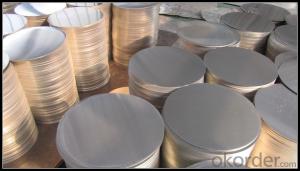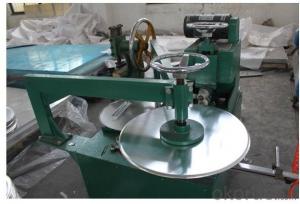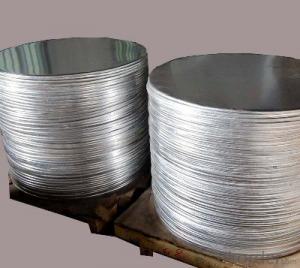Extruded Aluminum Ribbed Sheets - Aluminium Circle 1050 1060 1070 3003 for Cookware
- Loading Port:
- Shanghai
- Payment Terms:
- TT OR LC
- Min Order Qty:
- 1 m.t
- Supply Capability:
- 5000 m.t/month
OKorder Service Pledge
OKorder Financial Service
You Might Also Like
Product Introduction
Aluminum Circle/Disc is mainly used for general commercial and industrial uses, like the capacitor case, toothpaste case, medical tubes, kitchen ware, spray bottle, cosmetic case and glue tube case etc. With
high quality casting and rolling coils or hot-rolled coils as raw materials ,it goes through different cold r
olling deformation. slitting, annealing and finally stamping into an aluminum disc, then packaging for
delivery.
Product Process
Ingot/Master Alloys - Melting Furnace – Holding Furnace - D.C. Caster - Slab - Scalping - Hot Rolling Mill
–Cold Rolling Mill – Punching – Annealing Furnace - Final Inspection – Packing - Delivery
Specification | aluminium circles prices | |||||||||||
Alloy: 1050, 1060,1070, 1100, 1200,3003 etc. | ||||||||||||
Temper: O, H12, H22, H14, H24, H26, H18 etc. | ||||||||||||
Thickness: 0.2-200mm | ||||||||||||
Width: Up to 1800mm | ||||||||||||
Length: Up to 6000mm | ||||||||||||
Surface treatment: mill finished, anodized, embossed, PVC coated | ||||||||||||
Feature | Price is much more competitive than that of other series. | |||||||||||
Satisfy regular industrial process of stamping, drawing with good elongation, tensile strength and high formability. | ||||||||||||
Great plasticity, corrosion resistance, electrical conductiviy and termal conductivity. | ||||||||||||
Easy to be welded. | ||||||||||||
Easy to be pressure processed, extended and bent. | ||||||||||||
Application | Sign board, Advertising board, Building decoration, Car body, Cooking utensil, Lamp holder, Fan leaf, Electrical part, Chemical instrument, Machined part, Deep-drawn or spinned part, Welded part, Heat exchanger, Clock surface, Decotation, Reflective instrument etc. | |||||||||||
Alloy | Chemical Component %≤ | |||||||||||
Si | Fe | Cu | Mn | Mg | Cr | Ni | Zn | Ti | others | Al | ||
single | total | |||||||||||
1050 | 0.25 | 0.4 | 0.05 | 0.05 | 0.05 | \ | \ | 0.05 | 0.03 | 0.03 | \ | 99.50 |
1060 | 0.25 | 0.35 | 0.05 | 0.03 | 0.03 | \ | \ | 0.05 | 0.03 | 0.03 | \ | 99.60 |
1100 | 0.95 | 0.05-0.2 | 0.05 | \ | \ | \ | 0.1 | \ | 0.05 | 0.15 | 99.00 | |
1200 | 1.00 | 0.05 | 0.05 | \ | \ | \ | 0.1 | 0.05 | 0.05 | 0.15 | 99.00 | |
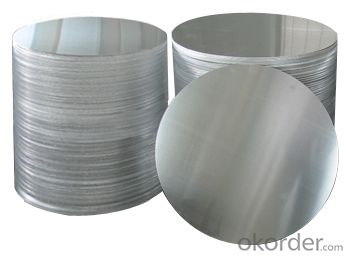
- Q: This question asks about the various types of aluminum sheets that are commonly used for roofing purposes, including their specific applications and characteristics.
- <p>Aluminum sheets used for roofing come in various types, each with unique properties and applications. The main types include: 1) Corrugated Aluminum Sheets: Known for their strength and durability, these are often used in commercial and industrial roofing due to their ability to withstand harsh weather conditions. 2) Standing Seam Aluminum Sheets: These provide a sleek, clean look and are favored for their water-resistant properties, making them ideal for residential and architectural applications. 3) Flat Aluminum Sheets: Offer a smooth surface finish and are used where a uniform appearance is desired. 4) Perforated Aluminum Sheets: These have small holes that allow for ventilation, reducing heat build-up and are used in areas requiring natural light and air circulation. 5) Embossed Aluminum Sheets: With a textured surface, they provide added rigidity and are used in both residential and commercial settings for their aesthetic appeal. Each type is chosen based on the specific needs of the roofing project, such as design, weather resistance, and longevity.</p>
- Q: Are aluminum sheets easy to clean?
- It is generally a simple task to clean aluminum sheets. Aluminum, being a non-porous material, has the advantage of not readily absorbing liquids or stains. Consequently, it is fairly easy to remove dirt, dust, or spills from the surface of aluminum sheets with the use of a moist cloth or sponge. Furthermore, aluminum's resistance to rust and corrosion means that no special cleaning agents or treatments are necessary. However, it is worth noting that abrasive cleaners or scrubbing pads should be avoided as they have the potential to scratch the aluminum surface. In summary, by regularly maintaining and employing proper cleaning techniques, aluminum sheets can be kept clean and in excellent condition for an extended period of time.
- Q: How much is the aluminum plate shearing machine?
- Aluminum plate is soft, want to blade better, or it is easy to cut askew, and the size according to type, shearing machine size, and there is configuration to set, Jiangsu Germany forging has sold as if
- Q: What type of aluminium sheet is a food grade?
- Pure aluminum, alloy aluminum can be. However, the majority of pure aluminum. Used by customers. You can inquire about our company: dexincheng Pioneer Metals corporation. Baidu will find the phone soon.
- Q: Can aluminum sheets be used for lithographic printing?
- Yes, aluminum sheets can be used for lithographic printing. Lithographic printing, also known as offset printing, is a popular printing technique that involves transferring an image from a plate onto a rubber blanket and then onto the printing surface. Aluminum sheets are commonly used as the base material for lithographic plates due to their excellent durability, lightweight nature, and ability to hold fine details. The aluminum sheets used for lithographic printing are typically coated with a photosensitive emulsion, which allows the image to be transferred onto the printing surface with precision and accuracy. This makes aluminum sheets an ideal choice for lithographic printing, especially for high-quality and large-scale printing projects.
- Q: Can the aluminum sheets be painted or coated with a different color?
- Yes, aluminum sheets can be painted or coated with a different color.
- Q: Can aluminum sheets be used for elevator interiors?
- Indeed, elevator interiors can certainly be constructed using aluminum sheets. Aluminum has gained significant popularity as a material of choice for elevator interiors due to its multitude of advantageous qualities. Its lightweight nature, durability, and resistance to corrosion render it highly suitable for long-term utilization in elevator applications. With ease, aluminum sheets can be skillfully fabricated and shaped to perfectly fit the dimensions and design specifications of elevator interiors. Furthermore, aluminum can be enhanced with various types of coatings or finishes, such as anodizing or powder coating, to not only augment its aesthetic appeal but also provide additional protection. Overall, aluminum sheets represent a practical and widely utilized option for elevator interiors within the industry.
- Q: Can aluminum sheets be anodized without affecting their dimensions?
- Yes, aluminum sheets can be anodized without significantly affecting their dimensions. Anodizing is an electrochemical process that forms a protective oxide layer on the surface of aluminum, which improves its corrosion resistance and durability. The anodizing process involves immersing the aluminum sheet in an acid bath and passing an electric current through it. This causes the aluminum to oxidize, creating a layer of aluminum oxide on the surface. During the anodizing process, the aluminum oxide layer grows inward into the metal, while also building up on the surface. The growth of the oxide layer is controlled by the duration of the anodizing process, and it can be precisely controlled to achieve the desired thickness. Therefore, the dimensional changes caused by anodizing are minimal and can be easily accounted for in the design phase. However, it is important to note that anodizing can cause a slight increase in the thickness of the aluminum sheet. This is due to the growth of the oxide layer on the surface. Typically, the increase in thickness is around 50% of the overall oxide layer thickness. For example, if the desired oxide layer thickness is 10 micrometers, the overall increase in sheet thickness would be approximately 5 micrometers. In summary, while anodizing aluminum sheets can cause a slight increase in thickness, the dimensional changes are minimal and can be accurately predicted and accounted for in the design phase. Anodizing is a popular and effective method for enhancing the properties of aluminum sheets without significantly affecting their dimensions.
- Q: What type of aluminum plate does the traffic sign use? 1100?
- Formulated according to unused specifications and design requirements. May refer to the road traffic sign and the marking establishment standard execution.
- Q: What are the benefits of using aluminum sheets?
- There are several benefits of using aluminum sheets. Firstly, aluminum sheets are lightweight compared to other metals, making them easier to handle and transport. Secondly, aluminum is highly resistant to corrosion, making it suitable for outdoor applications and in humid environments. Additionally, aluminum sheets are versatile and can be easily formed into various shapes and sizes, making them suitable for a wide range of applications. Moreover, aluminum is a good conductor of heat and electricity, making it ideal for use in electrical and thermal conductivity applications. Lastly, aluminum sheets are recyclable, making them a sustainable choice and reducing environmental impact.
Send your message to us
Extruded Aluminum Ribbed Sheets - Aluminium Circle 1050 1060 1070 3003 for Cookware
- Loading Port:
- Shanghai
- Payment Terms:
- TT OR LC
- Min Order Qty:
- 1 m.t
- Supply Capability:
- 5000 m.t/month
OKorder Service Pledge
OKorder Financial Service
Similar products
Hot products
Hot Searches
Related keywords
